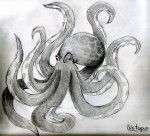|
|

Can the presence of intelligent behavior in other creatures (creatures that don’t have a nervous system comparable to ours) tell us something about what ideas are, or how thought fits into nature’s actions? It has always seemed to us humans that our ideas are one of the fruits of what we call our ‘intelligence.’ And […]
The analysis of collective behavior is quickly becoming cross-disciplinary. I wrote a few years ago about a study that analyzed the coordination of starling flocks. That post was based on the work of Thierry Mora and William Bialek, presented in their paper Are Biological Systems Poised at Criticality. The paper was published in the Journal […]
Studies and insights into the nature of consciousness always get my attention. Inevitably I see mathematics in the discussion, tangentially or directly (as with Giulio Tononi’s qualia space). I’d like to outline, here, a particular train of thought that emerged after reading a couple of articles and a few papers.
The first of these, written […]
Yesterday I gave a talk at a symposium at the 36th annual Cognitive Science Conference. The content of the talk was described this way in our symposium proposal:
Mathematics has been the subject of experimental studies in cognitive science that explore the sensory grounding of number and magnitude. But mathematics also provides conceptual schemes that […]
As I have investigated all of the things in science and mathematics that get my attention, I have developed an impression of mathematics that, philosophically, seems most consistent with Humberto Maturana’s biology of language. Maturana outlines his perspective in great detail in an essay by the same name that appeared in 1978 in the text […]
An article in the December issue of Scientific American gave me a new insect behavior to ponder and one that might reveal, in the insect’s biology, a distant cousin to the mathematical idea we call mapping. It seems that there are insects that have a talent for recognizing faces. Their talent has much in common […]
Understanding the neural functions that contribute to the birth of mathematical structure and meaning is an active subject of research in cognitive science. A significant amount of work has been done to identify an innate ability we share with other creatures, namely the ability to perceive quantity. This is sometimes called our approximate number sense. […]
The most recent issue of New Scientist has an article called Thoughts: The inside story. In it, philosopher Tim Bayne begins with a survey of all of the things we mean by the word ‘thought’ – the mental activity that accompanies perceptions, problem solving, the integration of various perceptions, the uncontrolled associative train of connected […]
One of the reasons that the nature of mathematics has been such an enigma, is that we associate it with thought, and we tend to distinguish thought from the physical world. We do find mathematics in natural structures – some of these beautifully represented in a film you may have seen called Nature by the […]
I’d like today to stay on the topic of mathematics from the cognitive science perspective, and in particular, to make available another set of interesting studies summarized by C. R. Gallistel, Rochel Gelman and Sara Cordes. The studies are described in their contribution to the book Evolution and Culture (edited by Stephen C. Levinson and […]
|
|



Recent Comments